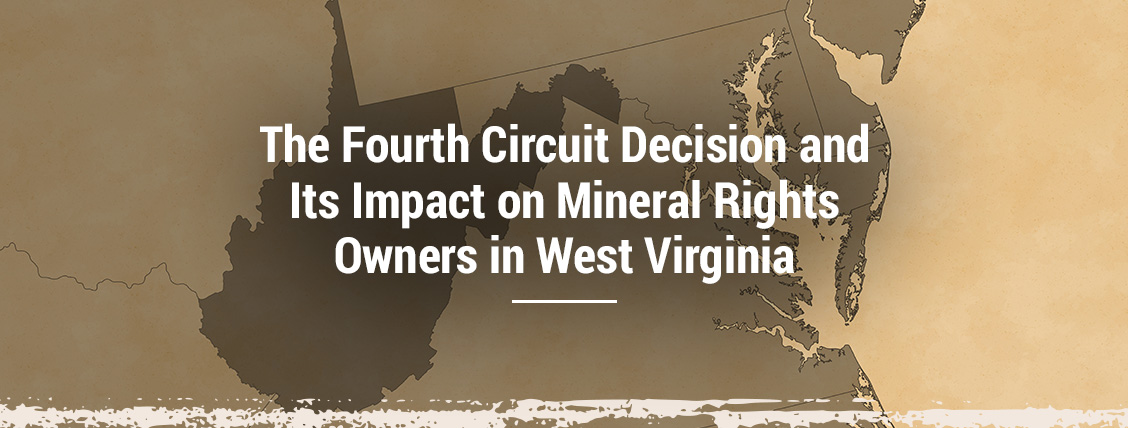
Table of Contents
- An Overview of the Fourth Circuit Court Decision
- What Is the Marketable Product Rule in Oil and Gas?
- What Are the Tawney Requirements?
- How to Negotiate for Fair Lease Terms: Tips and Best Practices
- Key Takeaways for Mineral Rights Owners
- Why Trust Us?
- Trust Flat River Minerals With Your Mineral Rights
Legal requirements change rapidly in the oil and gas industry, and keeping up with those changes is critical for ensuring property owners are adequately and properly compensated for the use of their property. The recent ruling on mineral rights royalty payments from the U.S. Fourth Circuit Court of Appeals is one such example.
If you own mineral rights in West Virginia, this decision applies directly to you and your property. Here’s a quick guide to everything you need to know.
An Overview of the Fourth Circuit Court Decision
In the 2015 West Virginia royalty case Gerald Corder v. Antero Resources Corporation, the District Court ruled that Antero had breached its leases with mineral rights owners by deducting post-production costs from royalty payments without proper authorization.
Some examples of those costs include:
- Transportation to processing and market locations
- Time held in storage facilities
- Gas compression fees
- Sales and marketing fees
- Severance taxes imposed on mineral extraction
Antero appealed this ruling, and the case went on to the Fourth Circuit Court of Appeals in 2023, which partially upheld the District Court’s order.
Here’s what that means. According to the Fourth Circuit Court, some leases without a Market Enhancement Clause do not authorize the lessee to make post-production deductions on royalty payments. Leases that include this clause do authorize these deductions, but only in specific circumstances.
While West Virginia has traditionally followed the “marketable product” rule, which puts all non-production costs on the lessee until the product becomes marketable, the rule now applies through the entire point of sale.
What Is the Marketable Product Rule in Oil and Gas?
The Marketable Product Rule helps companies calculate total royalties for oil and gas products by establishing when and how production happens. Again, the lessee is responsible for the costs of retrieving and processing gas until it is marketable.
To understand the Marketable Product Rule, you must know the difference between raw gas and sales gas:
- Raw gas: Freshly extracted and unprocessed natural gas is known as raw gas. It must undergo processing to remove impurities, which turns it into a marketable product.
- Sales gas: Also known as post-processing gas, sales gas is now marketable because it no longer contains impurities that make it unsuitable for use in pipelines and other similar applications.
According to West Virginia precedent, gas becomes marketable only after processing. These processes simultaneously add value to the gas and incur significant costs on the part of the lessee.
Previously, the Marketable Product Rule in West Virginia only applied to the point of marketability. Now it extends to the point of sale, when processed gas actually sells.
Lessees often attempt to use the original Marketable Product Rule to their advantage by deducting post-production costs from the sales gas price, decreasing landowner royalties. Whether this deduction is fair depends on how well your lease agreement meets the Tawney Requirements.
What Are the Tawney Requirements?
Unless your lease meets the Tawney Requirements — a set of criteria established in the West Virginia Supreme Court case Tawney v. Columbia Natural Resources, LLC — your lessee cannot deduct post-production costs that they incur from your royalty payments.
The Tawney decision states that for a lessee to be able to deduct post-production costs from a landowner’s royalty payment, a lease must:
- Clearly state that you, as the landowner, are responsible for some of the costs after the extraction of the oil, gas or mineral to the surface. These are called post-production costs.
- Provide with specificity the reasons and exact numbers reflecting the lessee’s planned royalty deductions.
- Contain language explaining how the lessee will calculate deductions for additional costs incurred after production.
These requirements apply to both proceeds and market value leases, meaning that your agreement must meet these criteria regardless of the type of lease you have.
How to Negotiate for Fair Lease Terms: Tips and Best Practices
Use these tips to ensure you’re getting the best price for your minerals:

- Review your agreement: Carefully examine your lease agreement and note any costs or provisions that seem unreasonable. These sections will be the best places to begin negotiations.
- Understand cost categories: When negotiating, make sure you know exactly what your lessee is referring to if there are any specific post-production costs listed in your lease agreement. This precaution can help prevent your lessee from taking excessively high deductions. Remember, if the lease does not mention deducting any post-production costs or doesn’t list them with sufficient specificity, the lessee cannot deduct these costs from your royalty payment.
- Be specific: Make sure you challenge specific deductions, such as transportation costs, processing fees and performance-based deductions, to improve your chances at getting your desired results.
- Limit total deductions: Proposing a cap on the total amount your lessee can deduct from your royalties ensures consistent, predictable income regardless of your well performance.
- Avoid settling: Settling for the first offer your partner gives you can lead to disappointing returns. Instead, persist in negotiating terms that benefit you and bring in more revenue.
Getting legal help here is a smart idea. It’s best to consult with an attorney who has experience with oil and gas leases, as they can help you ensure a successful negotiation.
Key Takeaways for Mineral Rights Owners
As a mineral rights owner, you likely don’t need to know all the specific details of this particular case. However, it’s important that you understand the following takeaways:
- Your lessee is generally responsible for all production costs through the point of sale.
- Your lessee can deduct post-production costs from your royalty payment only if your lease agreement meets the Tawney Requirements.
- Marketable gas must be processed to be suitable for sale.
If you have any questions about how the new ruling applies to your specific situation, calling on a legal professional is going to be your best bet for ensuring you’re getting the best possible payments.
Why Trust Us?
The leadership team at Flat River Minerals has decades of collective experience in the both the domestic and international oil and gas sectors. We use that expertise to create useful articles for mineral rights owners like you, so you can make more informed decisions on what to do with your property.
We strive to be a trusted resource, and we ensure all our information is factual and up to date. If you have any questions about anything you find on our site, you can contact our team for more information.

Trust Flat River Minerals With Your Mineral Rights
Are you considering selling or leasing your West Virginia minerals? You need a reputable partner who can give you what you deserve.
While signing a traditional arrangement could leave you waiting decades for your lessee to drill into your land, selling to Flat River Minerals enables you to realize the total value of your minerals in one lump sum. We also value your property based on technical forecasts of future development and production, ensuring you’ll get the best possible price.
Ready to get started? Contact us today for a free valuation!
